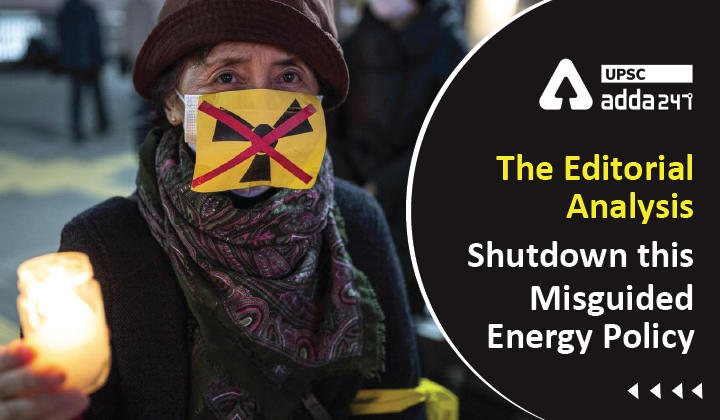Table of Contents
Nuclear energy India: Relevance
- GS 3: Infrastructure: Energy, Ports, Roads, Airports, Railways etc.
Nuclear plants in India: Context
- On December last year, the Indian government informed Parliament that it plans to build “10 indigenous reactors in fleet mode” and had granted “in principle approval” for 28 additional reactors, including 24 to be imported from France, the U.S. and Russia.
India’s nuclear policy: Key points
- The author considers the above policy misguided, given the post-Fukushima global and national trends in the nuclear industry.
- The author is of the view that nuclear power is neither an economical source of electricity nor a viable route to meeting India’s climate goals.
India’s nuclear policy: Issues
- Nuclear power plants are capital intensive and recent nuclear builds have suffered major cost overruns.
- Renewable-energy technologies have become cheaper, thus providing a good and viable alternative.
- In 2020, the International Energy Agency dubbed solar energy the “new king of electricity”.
- All over the world, countries are cutting their nuclear capacity; India, however, would have 650GW of installed capacity by 2050.
- Unviable imports: Even after 13 years of its conclusion, no new nuclear plant has been established.
- Risks: Nuclear disaster might leave large swathes of land uninhabitable — as in Chernobyl — or require a prohibitively expensive clean-up — as in Fukushima, where the final costs may exceed $600 billion.
- Questionable laws: India’s liability law already largely protects them. For example: MNCs have been insisting multinational nuclear suppliers that they be indemnified of liability for the consequence of any accident in India.
- Climate issues: Climate change will increase the risk of nuclear reactor accidents.
- Example: In 2020, a windstorm caused the Duane Arnold nuclear plant in the U.S. to cease operations.
- The frequency of such extreme weather events is likely to increase in the future.
Nuclear energy: Way forward
- Government should unambiguously cancel its plans for a nuclear expansion as nuclear power is not the right choice to “adapt” to climate change.
- Nuclear energy is also not the appropriate choice for mitigating India’s carbon emissions since it cannot be deployed at the necessary scale.
Read current affairs for UPSC





 TSPSC Group 1 Question Paper 2024, Downl...
TSPSC Group 1 Question Paper 2024, Downl...
 TSPSC Group 1 Answer key 2024 Out, Downl...
TSPSC Group 1 Answer key 2024 Out, Downl...
 UPSC Prelims 2024 Question Paper, Downlo...
UPSC Prelims 2024 Question Paper, Downlo...




